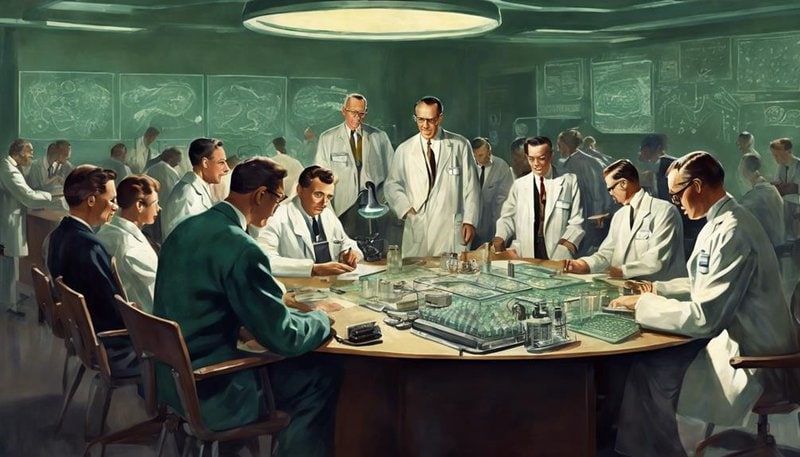Who and When Created Artificial Intelligence

The field of artificial intelligence (AI) has evolved rapidly since its inception in 1956 when Alan Turing posed the question, ‘Can machines think?’ John McCarthy, a pioneer in the field, coined the term AI to describe the quest for creating intelligent machines.
This marked the beginning of a journey to develop systems that can mimic human cognitive functions, leading to advancements in various domains such as machine learning, natural language processing, and robotics.
Early Concepts of AI
In the dawn of artificial intelligence, the seeds of innovation were sown in the minds of visionaries and pioneers alike. The early development of AI can be traced back to a rich historical context where human creativity and curiosity converged to push the boundaries of what was deemed possible. During this era, the concept of machines possessing intelligence akin to humans began to take shape, sparking a revolution in the domain of technology and philosophy.
In the tapestry of time, the early years of AI were marked by fervent exploration and experimentation. Visionaries dared to dream of machines that could simulate human cognition, paving the way for a future where artificial beings could aid humanity in ways previously unimaginable. The historical context of this period reveals a tapestry woven with threads of innovation, determination, and an insatiable thirst for progress.
As you enter into the annals of AI’s early development, you enter on a journey through the minds of those who dared to challenge the status quo, laying the foundation for the remarkable advancements that would follow.
Key Takeaways
- Alan Turing and key pioneers in the 1950s laid the foundation for artificial intelligence.
- The Dartmouth Conference in 1956 marked the official genesis of AI as a field.
- John McCarthy coined the term ‘artificial intelligence’ in 1956, solidifying its identity.
- Visionaries like Turing and McCarthy ignited a new era of technological possibilities in AI.
Alan Turing’s Contributions
Journey through the intellect of Alan Turing, where his visionary concepts laid the foundation for artificial intelligence to flourish.
Explore Turing’s profound insights into the domain of AI, particularly his groundbreaking notion of the Turing Machine that revolutionized computational thinking.
Witness the intricate tapestry of ideas woven by Turing, guiding us towards a deeper understanding of the possibilities within the domain of artificial intelligence.
Turing’s AI Vision
Alan Turing, with his pioneering work in computational theory, laid the foundation for modern artificial intelligence, forever shaping the course of technological advancement. His legacy in AI development continues to inspire innovation and curiosity in the domain of machine intelligence.
Here are four insightful perspectives on Turing’s AI vision:
- Breaking Barriers: Turing’s vision transcended the constraints of his time, pushing boundaries and expanding possibilities within AI development.
- Humanizing Machines: His ideas emphasized the importance of creating AI systems that mimic human thought processes, fostering a deeper connection between man and machine.
- Ethical Considerations: Turing highlighted the significance of ethical frameworks in AI design, advocating for responsible and conscientious development practices.
- Unlocking Potential: His foresight unlocked the untapped potential of artificial intelligence, opening doors to a future where technology harmoniously coexists with humanity.
Turing’s Machine Concept
With the brilliance of a visionary, Alan Turing revolutionized the landscape of artificial intelligence through his groundbreaking concept of the Turing Machine. Turing’s innovative idea laid the foundation for modern computing and machine learning.
The Turing Machine, a theoretical device capable of simulating algorithms, played a pivotal role in shaping the development of AI technology. Moreover, Turing’s proposal of the Turing Test, a method to assess a machine’s ability to exhibit intelligent behavior equivalent to or indistinguishable from that of a human, remains a fundamental concept in the field of artificial intelligence.
Turing’s contributions not only sparked advancements in AI but also challenged the boundaries of what machines could achieve, paving the way for a future where artificial intelligence continues to evolve and redefine our world.
Dartmouth Conference in 1956

As you commence on exploring the Dartmouth Conference in 1956, you’re delving into the genesis of artificial intelligence. This historic gathering convened brilliant minds like John McCarthy and Marvin Minsky, laying the groundwork for the burgeoning field of AI.
The impact of this conference reverberates in today’s technology landscape, shaping the way we interact with intelligent systems.
Dartmouth Conference Overview
Gathered in the summer of 1956, visionaries and pioneers convened at the historic Dartmouth Conference to lay the groundwork for the future of artificial intelligence.
- Shared Vision: Individuals came together to envision a world where machines could simulate human cognitive abilities.
- Collaborative Spirit: Participants recognized the challenges of logic-based approaches and embraced the diversity of ideas to overcome them.
- Innovative Discussions: Conversations revolved around cognitive modeling and the inherent limitations faced in replicating human intelligence.
- Seeds of Change: The Dartmouth Conference planted the seeds of AI, fostering a sense of freedom to explore uncharted territories and push the boundaries of what was deemed possible.
Key AI Pioneers
At the Dartmouth Conference in 1956, the pioneering minds who shaped the landscape of artificial intelligence converged to ignite a new era of technological possibilities. These visionaries laid the foundation for AI ethics and explored the vast potential of AI applications.
By investigating an environment of collaboration and innovation, they set the stage for the development of intelligent machines that could learn, reason, and adapt. Their work not only sparked curiosity but also raised important questions about the ethical implications of AI.
As you explore the history of AI pioneers, you’ll discover a rich tapestry of ideas and challenges that have influenced the evolution of artificial intelligence. Embrace the wisdom of these trailblazers as you navigate the ever-expanding world of AI.
Impact on Technology
The transformative discussions held at the Dartmouth Conference in 1956 reshaped the technological landscape, heralding a new era of possibilities for artificial intelligence.
- Ethical implications: As AI capabilities expand, questions around the ethical use of this technology become paramount.
- Job displacement: The integration of AI in various sectors raises concerns about potential job displacement and the need for upskilling the workforce.
- Human-machine collaboration: The synergy between humans and AI opens doors to new collaborative opportunities, enhancing productivity and efficiency.
- Future advancements: With rapid advancements in AI, the future holds endless possibilities for innovation and growth, revolutionizing industries and daily life.
Embrace the evolving technological landscape, ponder the ethics, and seize the collaborative potential for a future where AI enriches rather than diminishes.
John McCarthy and the Term ‘AI

John McCarthy, a pioneering figure in the field of artificial intelligence, coined the term ‘AI’ in 1956. His profound contribution not only gave a name to the field but also laid the groundwork for the future of technology and innovation. The evolution of the AI term has been instrumental in shaping the discourse surrounding intelligent machines and their capabilities. Below is a table highlighting key points in the AI term evolution:
| Year | Development | Significance |
|---|---|---|
| 1956 | Coined the term ‘AI’ | Birth of the AI field |
| 1970 | AI Winter | Period of decreased funding |
| 1997 | IBM’s Deep Blue defeats Kasparov in chess | AI’s ability to outperform humans |
| 2012 | Google Brain’s deep learning research | Resurgence of interest in AI |
John McCarthy’s foresight and ingenuity set the stage for the continuous growth and exploration within the domain of artificial intelligence, empowering individuals to push the boundaries of what is possible.
The Rise of Machine Learning
With the foundation laid by John McCarthy’s pioneering work in artificial intelligence, the current landscape now witnesses the ascension of machine learning as a pivotal force in technological advancement. Embracing machine learning opens a world of possibilities, where algorithms learn from data, make decisions, and improve over time.
Here are four key aspects to consider:
- Deep Learning: To consider into the depths of neural networks and intricate algorithms that mimic the human brain’s decision-making processes, enabling machines to recognize patterns and make complex decisions without human intervention.
- Data Analytics: Harness the power of vast amounts of data to drive insights, make informed decisions, and predict future trends with accuracy, revolutionizing industries and transforming the way businesses operate.
- Continuous Improvement: Witness the magic of machine learning as systems adapt and improve autonomously, learning from new data and experiences to enhance performance continually.
- Innovation Acceleration: Experience a rapid evolution in technology, where machine learning fuels innovation, propelling society into a future where the unimaginable becomes reality.
Expert Systems in the 1970s

In the field of artificial intelligence, the 1970s heralded the emergence of expert systems as a groundbreaking approach to problem-solving and decision-making. Expert systems were designed to mimic the problem-solving abilities of human experts in specific domains by using knowledge representation techniques. These systems utilized a rule-based approach, where a set of rules encoded the expertise of human specialists to provide solutions to complex problems and aid in decision-making processes.
Expert systems revolutionized various industries, from medicine to finance, by offering intelligent insights and recommendations based on logical reasoning and problem-solving strategies. They excelled in tasks that required expertise and knowledge, making them valuable tools for organizations seeking efficient and accurate decision support.
Neural Networks Resurgence
Experiencing a resurgence in modern times, neural networks have once again captured the spotlight in the domain of artificial intelligence with their remarkable capabilities for learning and adaptation. These intricate systems, mimicking the human brain’s neural connections, have opened up a world of possibilities in the AI landscape. Here is a succinct breakdown of their impact on the field:
- Deep Learning: Neural networks are the backbone of deep learning, a subset of AI that focuses on training algorithms to learn and make intelligent decisions on their own.
- AI Ethics: As neural networks become more sophisticated, the conversation around AI ethics intensifies. Ensuring that these systems operate ethically and responsibly is vital for their widespread acceptance and integration into society.
- Innovative Solutions: Neural networks are driving innovation across various industries, from healthcare to finance, by offering powerful tools for data analysis and pattern recognition.
- Continuous Evolution: With ongoing research and advancements, neural networks continue to evolve, pushing the boundaries of what AI can achieve and shaping the future of technology.
Modern AI Advancements

Behold the current era of artificial intelligence, where groundbreaking advancements are reshaping the very fabric of technological innovation. In this age of rapid progress, deep learning advancements have propelled AI to new heights, enabling machines to learn complex patterns and make decisions with unmatched accuracy. Robotics integration has also reached new levels, with robots becoming more autonomous and capable of performing intricate tasks previously reserved for humans.
Let’s explore the table below to examine two key aspects driving the evolution of modern AI:
| Deep Learning Advancements | Robotics Integration |
|---|---|
| Neural networks mimicking human brain functions | Robots collaborating seamlessly with humans |
| Enhanced natural language processing capabilities | Integration of AI in healthcare, manufacturing, and more |
| Improved image and speech recognition systems | Autonomous vehicles revolutionizing transportation |
| Advancements in reinforcement learning algorithms | Robotics enhancing efficiency in various industries |
| Pioneering research in unsupervised learning techniques | Robotics transforming customer service and logistics |
Moreover, as AI continues to advance, the discussion around AI ethics and the potential of quantum computing to revolutionize AI capabilities are becoming increasingly important topics to consider. The future of AI holds immense promise, but it is important to navigate these advancements with a keen eye on ethical considerations and the transformative power of quantum computing.
Frequently Asked Questions
What Impact Did World War II Have on the Development of Artificial Intelligence?
During World War II, the impact on artificial intelligence was significant. The need for advanced technology fueled funding and innovation, pushing boundaries in creating intelligent machines. This pivotal era laid the groundwork for future AI developments.
How Did the Cold War Influence the Research and Funding of AI Projects?
During the Cold War, the intense rivalry spurred nations to pour funds into AI research, fueling groundbreaking projects. The competition for technological supremacy shaped the evolution of AI, propelling innovation in diverse fields.
What Role Did Women Play in the Early Development of Artificial Intelligence?
In the early development of artificial intelligence, women pioneers made invaluable contributions. Their innovative ideas and groundbreaking work paved the way for advancements in this field, demonstrating their essential role in shaping AI’s history.
How Has the Ethical Debate Surrounding AI Evolved Over the Years?
You’ve seen the ethical debate around AI shift dramatically. Privacy concerns grow with each technological leap. Recognizing bias is essential for fair AI. Regulations are essential to guide this powerful tool ethically.
What Are Some of the Biggest Challenges Facing the Future of Artificial Intelligence Research and Development?
Facing the future of AI research and development, you confront ethical dilemmas as technological advancements surge. Balancing progress with responsibility is paramount. Embrace the challenges ahead, for they shape the path to tomorrow.






